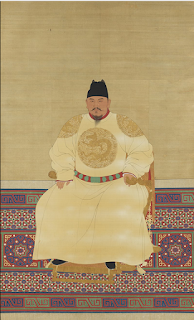23 January 1368 CE. Zhu Yuanzhang
23 January 1368 CE. Zhu Yuanzhang ascends to the throne of China as the Hongwu Emperor, initiating Ming Dynasty rule over China that would last for three centuries. In 1368 rebel armies—led by Zhu Yuanzhang (1328–1398)—overthrew the Yuan, and Zhu established a dynasty he named Da Ming (“Great Brightness”). The only emperor in China’s long history to have been born to a peasant family, Míng Dynasty that ruled China for nearly three hundred years. Born to a family of poor peasant farmers and orphaned at the age of 14, Zhu eventually became leader of a rebel army, and began to make plans for the overthrow of the Mongol (Yuan) dynasty. In 1363, Zhu defeated his rival Ch'en Yu-liang in the Battle of Lake Poyang (鄱陽湖之戰), one of the largest naval battles in world history. Zhu and the rebel forces advanced on Peking, forced the flight of the Mongol emperor, and proclaimed the Ming Dynasty in 1368. The reign of the Hongwu Emperor is notable for his unprecedented political reforms. The emperor abolished the position of chancellor, drastically reduced the role of court eunuchs, and adopted Draconian measures to address corruption.



Comments
Post a Comment